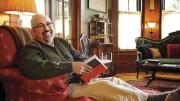Rafael Campo writes clear, inviting, open-hearted poems about the most difficult, most troubling, and—for readers unused to them—most private and least traditional of subjects. He is an associate professor of medicine at Harvard Medical School and practices at Beth Israel-Deaconess Medical Center. He treats—and writes about treating—people living with serious illness, especially HIV and AIDS. That enterprise informs all his six books of verse, but in his latest, Alternative Medicine (Duke University Press), his work as a doctor becomes, literally, central. The book’s three parts concern, in turn, Campo’s early years as a Cuban-American child of immigrants; his professional work, both clinical (“The Third Step in Obtaining an Arterial Blood Gas”) and interpersonal; and the rest of his life, as teacher of poets, traveler, gay man, lover, beloved, and citizen. The volume concludes with warm love poems (“You’re the heaven I’m still rising towards”), but its power rests with its patients and their troubles—in the repeated worry of the phrase “I’m not a real doc without my white coat,” with the hospitalized audience for “Wish Bone the cancer clown.”
By the time he entered Amherst College in the early 1980s, Campo knew he would be a doctor. He came to take poetry seriously thanks in part to his teacher Eve Kosofsky Sedgwick, who later helped create the field called queer theory. Her class, he says, let him “transgress into the realm of the literary” and “put on the drag of science in my poems.” “Part of my own impulse to write poems had to do with my queerness,” he continues, “wanting to be out, to have a voice.” Another impulse was humanistic, pushing back against “the impersonal norms...of a strictly biomedical paradigm” for pre-med and medical training.
Both impulses flourish in Alternative Medicine, which celebrates Campo’s erotic commitments in love poems (“Shared,” “Love Song for Love Songs”) and also speaks to his work in humanistic medicine, training other doctors to see their patients as whole people. A vigorous manifesto in couplets, with the not altogether ironic title “Reforming Health Care,” concludes by observing, “in the final absence of a cure,/ the need in all of us for someone’s care.”
The poet found Harvard Medical School “in some ways, very disheartening,” and took a year off to study creative writing at Boston University, where he evolved his pellucid formal style. After earning his M.D. in 1992, he took a medical residency in San Francisco, where—before the current “triple cocktail” treatment regime—“we had nothing to offer other than compassion” to gay men dying of AIDS in his care. Alternative Medicine looks back to those years—“Remember when it seemed miraculous/that most of our close friends weren’t dead? We feared/their blood...We cried/at patients’ funerals.”
These lines commit themselves at once to wide intelligibility—all the poems make sense the first time through—and to traditional ways of arranging words: pentameter quatrains, sonnets, a sestina, two double villanelles. Campo, who grew up fully bilingual, speculates that his pages’ clean shapes reveal his “immigrant mentality”: “to master these forms is becoming truly an English speaker.” Stanzas here address his second-generation identity: “We never learned to swim in bitterness:/to us, the river’s water’s flow is free.”
Campo makes a point of listening to his patients: their voices and their own writings inform his poetry, as they informed his book of essays The Healing Art (2003). “We doctors are famous for interrupting patients,” he explains; his work could help them speak. And yet the patients’ voices often tax the doctors’ temperaments; sick people need a kindness and a patience that their physicians cannot always provide. “Can’t you just be happy I’m gonna die/and give me my damn prescriptions?” asks one; another was “sure she was infected with a lie,/and inside her, it was the dream that died.”
Much of Campo’s writing—and some of his medical practice, too—seem designed to say to readers and nonreaders, the sick and the well, that we are not alone. Nor is Campo alone in his stylistic goals: fluent and sociable, versatile within his forms, he has something in common with the poet and translator Marilyn Hacker, and with the late poet Thom Gunn. “The kinds of poetry that I am writing,” Campo says, “I do hope will reach people in the hospital, people who are not necessarily poets themselves.” And yet that hope comes hand in hand, throughout Alternative Medicine, with the poet’s own need to explain hope and grief, life and death, memory and desire, to himself: as Campo puts it, “A doctor writes because he must, because / not one of us can stop the final cure.”








